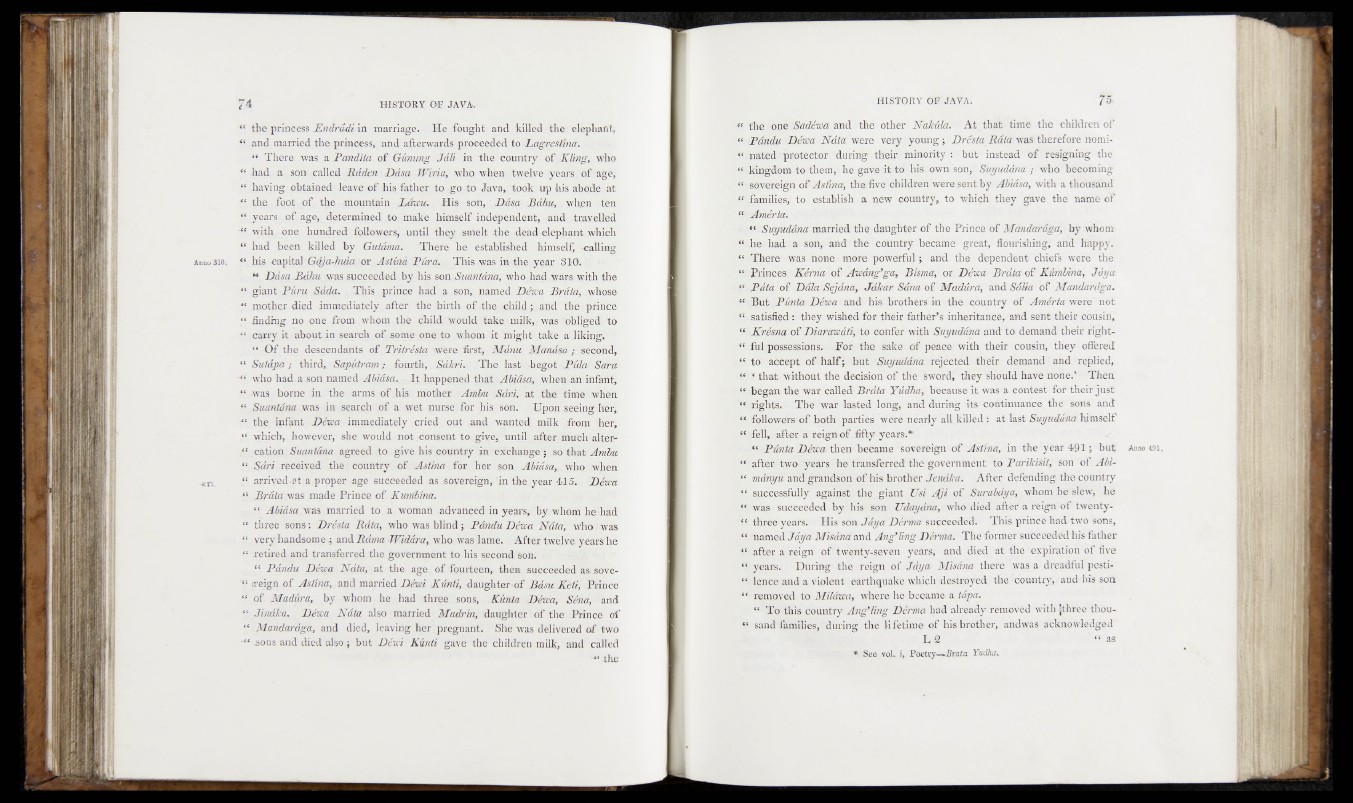
“ tte-princess Endrâdim marriage. He fought and ■ killed thei
“ -and married the princess, ; .and afterwards proceeded toEagrestinai ' i
“ There was a Pandlta of i Génung Jdli in the counfrsjV oîdÇiing,z who
“ -had,., a son -called Mdden * Ddsa JVima, who when^îjtÿ|elvé years;; of'"age,
“ having obtained fea^ipf-dris father to ,go.;to JaVa,-;Aoqk;up hfs âb&de::at
“ thejifopt of the .ÿî^puntain Lâoeu. HiSfï4Qp,;fcJ9s5Ç; Bdhu,,, when ntèn
“ years of age,, determined to make- -himself indgpendenttrjandr.traKdjSe'd
with one,, hundred followers, until they .smelt |hej^aAe|gpiiant\®bjeh
“ had .beeft killed by Gutama’. There 'te '$&8éfâtèlhà&:--.tinËa^ tellwag
“ his capital'Gàÿa-hùa 'or A&tinà.Pérài^Y^s. was in the year S&Cyjl
“ Ddsa Bakui was succeeded -by, his sowSuatotdna, who fhad-Wars with the
“ giant Pdrw Sdda. - This ;prince had B.rata, '.whose
“ mother died -immediately after the tetthr.^v^e^HM ^an’d the prince
it finding no ;one from whom the child 'would takfe;-^l§k,; wds^éèii^éfe'‘t'0
“ : carry it about ip search i of seine oteito whom it..
vi“ Ofthe_ descendants oSPfitrêsta were &'stj' Afóww Mdndsa .•r|séeçîidf.
“ Suidpa ; third,.- Sapé tram ; fourth, Sdkri. ' ;The tetJ-jb-egot PdPriSm'd
who had.a son named AUâsa. ,It tefpened Ibal^f'éjdsaj^whpn •aô&nfïmîi
“ was borne in the arms.of his, mother 'Amèu .Afea-nt tte-tfane
^ -Suaiitana was in. .s e a r ch of a-wet n t fB S C V f te b is ' s o b .- : Upon seeing her,
f§ the infant. Déma -immediately ^efiedjlojit IflW ’Uft?'
which, however, ste,tWüld;;.npt'..teniint;to;.'^|f|5Tap^Jji|Èÿÿp^Éi^ji^^^
cpÀon. Sucmtâna agreed, do -give his .country 'for^ê^hâ^gë’j >sô titi&frAmbu
“ Sdrï received the [ country of }Astîna-Tf4^d^Qr^dÿ.r,Abîâsa% who. .when
“ arriyed-et;a proper age succeeded as sovereign, in the year 415. Dfam
-“ . Brdta was made. Prince of Kurribina. ; '
“ Abiâsà.'was married to a, womail advaaeedin years,:ibynwhodi heihad
“ three sons: Drésta Rata, who was blind $-Pdndu Déteà Naid^sWUh was
f‘ . very handspme ; and R&rna rWidâra, who. was,feme. v Aff® feWftlve^iari’te;
“ retired and transferred the government to his second son! \
“ Pàndu Déoea Ndta, at the age. of fourteen, then succeeded asasove-
a-eign of Astina, :aad married Déiei Kutiti, daughter mf Bdsii K'eti, Prince
“ of Madéra, by whom he had three sons, K&nta Démi, Sém, aid
“ JindJca. Démi Nap. also married Madrin, daughter ' óf the Prince öf
“ Mandardga, and died, leaving her. pregnant. She was delivered of two
-“ -sons and died also| but Dém Kunti gave the children .milk, and called
B '
“ the-'bti&rSadewai and the other NaJcula. '' At that time the children of
“ pdndu‘ &ewa Ndta were very'young j DrestaRdta was therefore nomi-
“ nated protector during their 'minority : but instead of > resigning the
t«Jsingdom. tO''them,'j hC'ga’fee-dt to his own son," Suyuddna ; who becoming
“ sovereign of Astina, the five children were sent by Aiidsa, with a thousand
^^families, to establish a new country, to which they gave' the name of
‘WAtherfa- d
*$"'.Suyuddnam&Tried the daughter of the Prince of Mandardga, by whom
“ he had..a son,- and the country became great, flourishing, and happy.
“ There was - hone, more- powerful; and the dependent-chiefs were,r the
•*%dteneeSi->- Kdmd^of -A'wdng’ga, Bisma, or Dewa Brdta of Kumbvna, Jdya
“ P a p of -Ddla-Sejana,- Jdkar Sana of Madura, and Satia of Mandardga.
^ButJP^rate Dewa and his brothers in the country of Amertd were' not
?, satisfied-: they wished for their father’s inheritance, and sent their cousin,
“ Kresna of Diara!wdti,df> confer with Suyuddna and to demand their right-
‘OMubpossessions. - For ;the, sake- of peace with their cousin, they offered
to* accept of half j but Suyuddna rejected their demand and replied,
■ Jfti thafej without the decision 'of the sword) they should have none.’1 Then
began, the War called-Brite Yudha, because, it was a eontest 'for their just
“ rights.-- The war lasted long, and during its continuance the’ sons and
“ - -foliowerS- of both parties we’re nearly all killed : at last Suyuddna himself
“ fell, after a reign of fifty- years.*
*Vf*jPdnta -Sifwa- then became sovereign of Astina, in the year 491; but Am» ot.
“ after two- years he transferred the government f&Parikisib son of AM-
*' mdnyu and grandson of his brother Jendfra. After defending the country
against the giant Ust Ajji of Surabdya, whom be slew, he
“ was • succeeded by his son Udaydna, who died after a reign of twenty-
three-years. ■ His son Jdya Derma succeeded. This prince had two sons,
“ named Jdya Misdna and Ang1 ling Derma. The -former succeeded his father
“ after a reign of twenty-seven years, ' and died at the expiration of five
“ years. -During the reign of Jdya Misdna there was a dreadful pesti-
“ fence and a violent earthquake which destroyed the country, and his son
“ removed to Mildwa, where he became a tdpa.
“ To this country Ang’ling Denim had already removed with |three thou-
“ sand families, during the lifetime of his brother, andwas acknowledged
- L 2 “ as
* Sea vol. i. Poetry—^Braia Yudha.